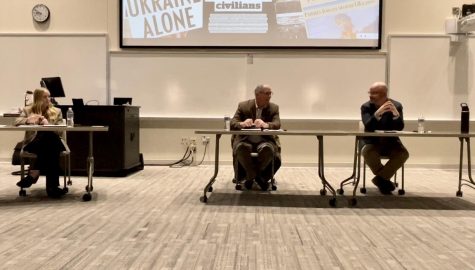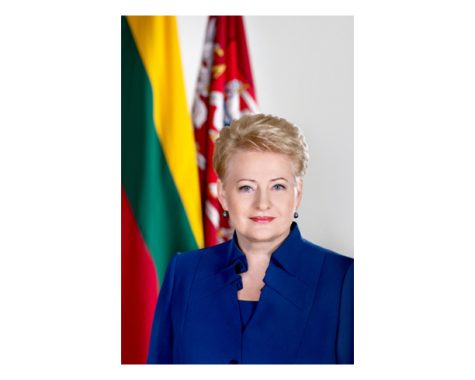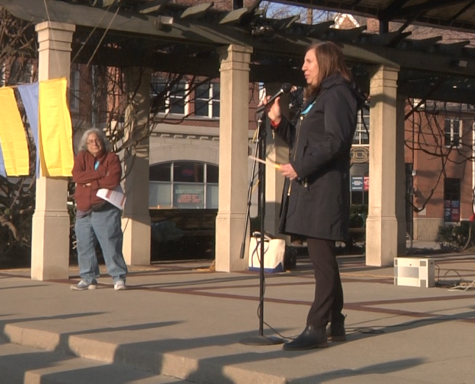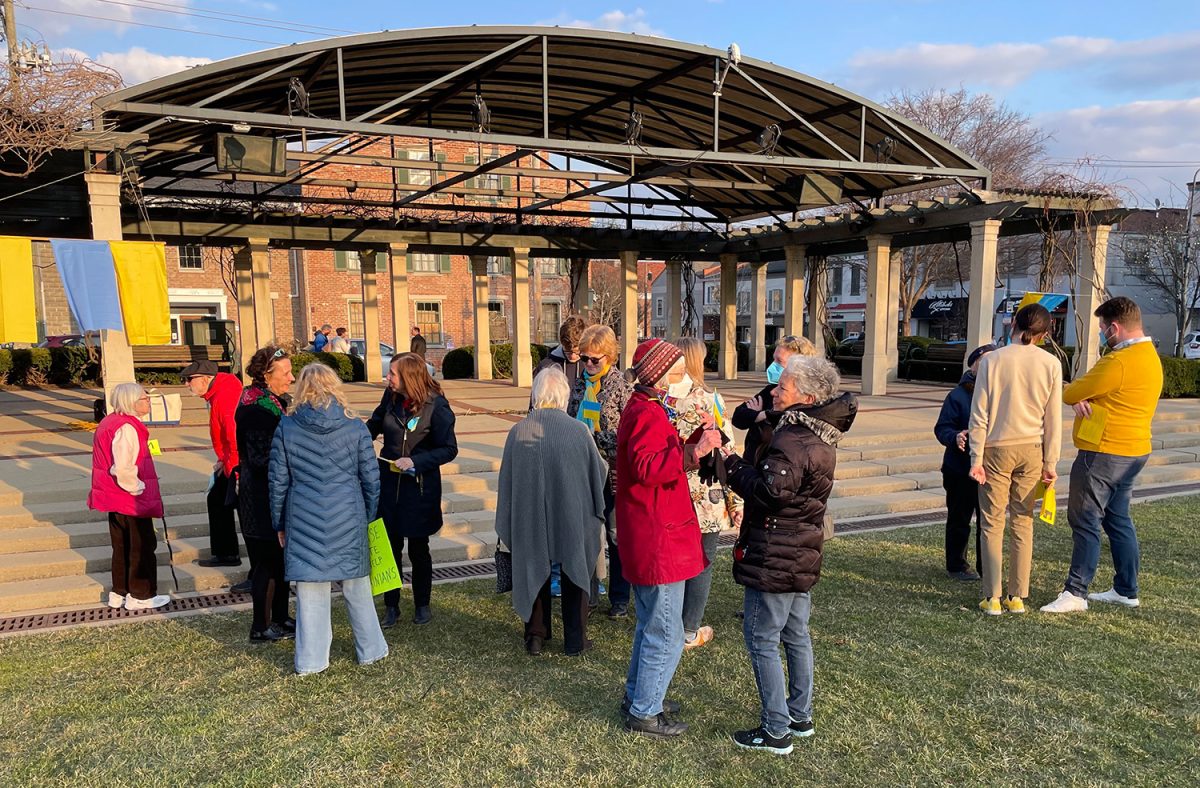Community shows solidarity with Ukraine
A group of Oxford community members gather to show their support for the citizens of Ukraine.
March 11, 2022
Throughout the past week, Oxford residents have gathered to learn about the war Russia is waging in Ukraine and to show solidarity and support for the people of Ukraine.
Tuesday, March 8, Miami University’s chapter of the Alexander Hamilton Society (AHS) hosted a discussion between two experts on the situation. Miami professor Stephen Norris is an expert on Russian history and is the director of the Havighurst Center for Russian and Post-Soviet Studies. Ohio State University Professor Peter Mansoor is an Army veteran and expert on military history.

AHS is a national professional organization which focuses on advancing careers in foreign policy. Around 50 people attended the discussion Tuesday evening.
“The event presented a unique opportunity for Miami students to learn about the current crisis directly from experts,” Miami AHS President Sophie Hess said, “Our distinguished guests provided military and historical context on the situation, insight into NATO responses and predictions for the future. We cannot thank them enough for their candid conversation.”
On Thursday, March 10, Oxford Citizens for Peace and Justice (OCPJ) hosted a vigil in Uptown Park for the people of Ukraine. More than 50 Oxford community members attended.
Also on Thursday, the Havighurst Center hosted former President of Lithuania Dalia Grybauskaitė, who spoke about the conflict and how she wished to see the rest of the world react. Around 300 people were in attendance.

Not everyone shared the same ideas about how this war will end, nor about what the involvement from the rest of the world should be. Mansoor believes that Putin will not take the conflict past the borders of Ukraine. Grybauskaitė is not so sure.
“If Putin is stupid enough as to cross into NATO territory, then NATO will go all in,” Mansoor said, “But, if he does what we think he will do and limits the conflict to Ukraine geography, then NATO will stay out of the way.”
Grybauskaitė said when faced with war, one has two options. The first is to fight back and stand up for what one believes in. The second is to resist war, get pulled into it anyways and be shameful that action was not taken sooner.
She said the latter is what happened when the Soviet Union consumed so many Eastern European states after the end of World War II, but the former is what is happening in Ukraine right now.
Lithuania became part of the Soviet Union when the Soviets occupied it after World War II. In 1990 it became the first country in the Soviet Union to break from the bloc and declare itself an independent nation. It is now a member of NATO.
The former president stressed that economic sanctions from the rest of the world will not stop this war. Vladimir Putin is already acting irrationally and unpredictably, so she said the only way to stop him is if he fears military retaliation from global powers. This includes having nuclear weapons on high alert.
Mansoor said that because Putin’s actions are so unpredictable right now, the possibility of this conflict going nuclear cannot be ruled out. Putin may see it as a last ditch effort to regain control of a situation that is not going in his favor. Norris explained that Putin likely does not have the backing of his people on this.
“In 2016, Vladimir Putin announced that the new national idea was patriotism, and it always has been patriotism, and it always will be patriotism,” Norris said, “In Putin’s terminology, patriotism is the willingness of Russians to sacrifice themselves for their country, to defend their motherland and to do what is right, even when the rest of the world thinks that Russia is in the wrong.”
Norris said this idea of patriotism is what has kept Putin in power for so long. When his poll numbers were falling in 2014, he invaded Crimea, which bolstered his popularity. However, Norris said this is not working now.
This is before Russian citizens know all the facts, which Putin is working to control. Norris said the Kremlin has said only 500 Russian soldiers have died, while the Kiev Independent Newspaper estimates that number is closer to 11,000.
On Friday March 4, a new Russian law went into effect that bans media coverage of the conflict the Kremlin does not agree with. The penalty for breaking this law is 15 years in prison.
“I think when reality breaks, so too does Putin’s support,” Norris said.
The Oxford citizens who attended the vigil made it clear they thought the violence is unnecessary and needs to stop. OCPJ urged people to donate money to organizations that are helping Ukrainians during this conflict.
Miami professor and affiliate of the Havighurst Center Dr. Liza Skryzhevska is from Ukraine and still has family there.
“I have been living through this horrible situation for two weeks now,” Skryzhevska said, “Every morning and every evening I call my family and try to comfort them with my words, because this is the only thing I can do right now. Being so far away, it is so difficult. It is much more difficult than I would be feeling if I were there.”

Around two million Ukrainians have fled to other counties, but Skryzhevska’s mother and aunts cannot because they are elderly and less mobile than many. She said there is not much that people in Oxford can do now, but that people’s support means a lot to her.
“Since this began two weeks ago, so many people have contacted me. So many people have expressed kind words. Just knowing that people know about it makes me feel stronger,” Skryzhevska said, “If you continue sending your good vibes over there, that is all you can do at the moment. And I thank you for that.”
For those who wish to learn more about this conflict, Miami’s Havighurst Center will be hosting Kateryna Babkina, a Ukrainian writer who fled from Kyiv to the Polish border with her mother and 1-year-old daughter as Russia began to bomb Ukraine. This event will be Monday, March 14 at noon over Zoom.














